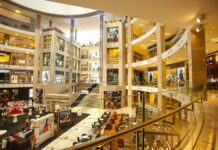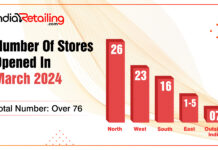The retail ecosystem in India is at the forefront of change. The year 2019 has been an interesting year for Indian retail – it is undergoing a sea of transformation, experiencing exponential growth, expanding not just in major cities and metros in the country, but also in Tier II and III cities and towns. Retailers are learning how to balance strategies between online and brick and mortar sales.
There are many factors driving this growth in the organised retail market in India, the primary among them being healthy economic growth, changing demographic profile, increasing disposable incomes, urbanisation, changing consumer tastes and preferences.
The retail industry is going a seismic shift to become much more diverse and vibrant, something which will only continue as consumers evolve and expect experiential offerings and multi-channel connect. And the ‘Who’s Who’ of the industry have been leading this change.
IMAGES Retail Bureau spoke to CEOs of top retail brands, to understand their experiences and learnings from the year 2019, and how they think the industry will shape up in the next year.
1. Salesh Grover, Business Head, OSL Luxury Collections Pvt. Ltd. – Corneliani
Expectations from the Retail Sector in 2020 – In the coming time, consumers will want to buy at the best price points and, at the same time, will ensure that the retailer they’re supporting is socially conscious.
We, as retailers need to implement the latest in-store technologies and deliver a superior shopping experience to Gen Z consumers and the millennials. The retail industry will face immense challenges in the coming years like demographic changes, raw materials becoming more expensive, consumers changing their behavior due to increasing digitalisation and e-commerce.
The retail market has been fragmented for a long time and is now heading towards a more consolidated model.
Importance of Technology in 2020 – New improvements in AI and Machine Learning provide unprecedented business insights for better results. Artificial Intelligence can provide the predictive capabilities and valuable insights like why retailers need to produce stronger business outcomes. These technologies enable retailers to detect valuable patterns to achieve desired results. While these new technologies will certainly be part of the overall retail landscape in 2020, they are all also available today. Many brands are already putting these in use and deploying the same to increase employee engagement, productivity, drive revenues high and retain customers. Social media also has ingrained itself into our daily lives in ways we never could’ve imagined ten years ago.
2. Naina Ruhail, Co-Founder, Vanity Wagon
Expectations from the Retail Sector in 2020 – There is no new flip that seem to introduce itself but the shift to online marketplaces and refinement of AI is what I feel will rise. Beauty specially is seeing a lot of AI developments recently and that seems to be the ‘go-to strategy’ for most marketplaces and brands. At Vanity Wagon, we are also working towards a few tech developments that would help us stand out from the market and position us on top of the industry.
Importance of Technology in 2020 – The impact of digitalization is huge. The focus of every company is to reduce the customer’s effort and deliver them the best in the shortest time possible and technology, social media and web 2.0 seems to aid it in the future as well. The distances will continue to vacuum while the choices will become wider; and all this is due to the advent and betterment in technology. Retail, with its shift to the online model is heavily dependent on tech and social networking and this will continue to rise as we go forward. The impact of social commerce is definitely going to be huge going forward.
3. Anupam Bansal, MD Retail, Liberty Shoes
Expectations from the Retail Sector in 2020 – I would like to see better value proposition when it comes to retail shopping. Brands should work towards achieving sustainability and the concept of stores should keep rolling. Moreover, brands should create more personalized experience for customers.
Importance of Technology in 2020 – Definitely 2020 is going to see immense transformation on the retail industry considering the technological advancements. The new hi-tech tools will help keep the balance inventory in a much-sorted way. The new innovations in IT will help in managing retail operations in a better way. One such technology is the wireless technology which has played a big role in transformation of the retail industry, though we are all yet to abide by the same, considering the deployment costs and security concerns.
4. Narinder Singh Dhingra, Chief Managing Director, Numero Uno
Expectations from the Retail Sector in 2020 – Omnichannel model will become need of the hour for all businesses. Sustainable fashion is here to stay which will reflect heavily in retail sector.
5. Pushkaraj Shenai, CEO, Lakme Lever
Expectations from the Retail Sector in 2020 – We have seen a gradual change in the retail sector – the pace should pick up in 2020. Transactional retail environments will fade as e-commerce will be cheaper, faster and more convenient. This shift is already prevalent globally with key retailers scaling down. It is imperative for retailers to dial up the brand experience where shoppers enjoy spending their time as much as their money.
Technology will increasingly make the customer journey more efficient and engaging and will reduce human interaction at every step. From food to travel and banking, everything will be a click away. Even for a service industry like ours, customers are turning to the Lakme Salon app to book their appointments, check their points and give feedback on our NPS system.
Store designs will be more engaging, and consumers will be more receptive to experimenting. Retailers will need to keep reinventing themselves to remain relevant.
Importance of Technology in 2020 – Boundaries between the physical retail space and digital/social presence of the brand will blur even more. Retail currently is undergoing a major revolutionary change. There are a lot of advancements like robotics, personal recognition, digital wallet, AI, consumer analytics and other tech driven initiatives designed to make shopping exciting both in stores and over the Internet. Retailers will have to move with the time and adapt to these changes. Those that embrace technology and let the consumer be in-charge, will thrive.
6. Sachi Maker, Vice-President, Traworld
Expectations from the Retail Sector in 2020 – Our industry is growing tremendously and getting competitive day by day. 2020 is more likely to see changes in features of the luggage based on consumer needs and a larger than life visual merchandising, that will be anything but mainstream. We live in the world of millennials and visual treats have become more attractive and effective than any other medium and brands have started to realise that.
Importance of Technology in 2020 – The shift from offline to online is slowly taking place in India. However, offline still plays a vital role in the luggage industry and consumers still like to personally experience the products in person. In the coming years, however, technology will definitely play a large part in the retail industry as our consumers have become exposed to content on a daily basis. We need to generate technology and social media driven products to cater to the needs of our consumers.
7. Harkirat Singh, Managing Director, Aero Club (The maker of Woodland & WOODS)
Expectations from the Retail Sector in 2020 – We can see 3 major changes in retail sector in 2020:
– Consumers are Choosing Multichannel Buying Experiences: Customers are moving seamlessly between online and offline experiences and are open to retailers who can best facilitate these transitions. The explosion in mobile retail means in-store research and showrooming – the practice of viewing a product in-store only to make the purchase online – are now more common than ever. On the other side of the coin, online orders can be delivered to a local store – often for free – further closing the divide between online and offline retail. The solution here is to focus on creating a second-to-none customer experience across all channels. Customers are looking for retailers they can be trusted to deliver exceptional service time and again.
– Customers Expect a Seamless Experience: If retailers can create this type of fluid online/offline experience for their customers, they can cease pitting their channels against one another. Centralized customer data can help retailers build a seamless, fluid experience – beginning with an easily-accessible customer profile. Loyalty programs can help, by collecting relevant information and putting it to use. A retailer can use its loyalty program to not only reward customers but deliver relevant content and integrate data across all interaction points – including online interactions, in-store sales, and home service technicians – creating an integrated, Omnichannel customer experience.
– Inventory management: It’s not difficult to guess the inventory needed for popular goods. But for no-so-popular goods, inventory management is challenging but essential. Retailers might be lured by a higher margin offered by new principal companies who want to grab market share. But how much of that inventory sells depends on the principal company’s marketing, reputation, product demand and customer support. The more time goods spend on shelves and in warehouses, the more the revenue of retailers is impacted.
Importance of Technology in 2020 – The impact of technology, social networking and Web 2.0 will bring the best of the growth in retail industry in 2020. Technology has shown a tremendous growth in last 5-7 years. It has played a major role in bringing standardization of all the products with an increase in production and bringing down prices for customers than before. Still, the capital outlay required will result in making cost/ benefit analysis essential. The capabilities of staff, as regards technology, are of utmost importance to successful implementation. The size of the business also has considerable consequences. The advantages offered by technology include business process re-engineering, just in time ordering, electronic shelf labels, point of sale systems etc. These advantages offer greater efficiency, effectiveness, and advantage, as well as cost reduction, improvements in quality etc. One area that has been affected by technology is benefits to the supply chain. Effects of technology are clearly described in the concepts of the value chain and the value system.
When it comes to social media, it is a phenomenon that has drawn a lot of attention both of companies and individuals interacting on the networking landscape. Social media offers affordable opportunities to reach larger population. Additionally, online campaigns on social media can benefit from the persuasive features of interactive multi-media systems. Social media is a phenomenon that has become an important aspect in marketing mix and revolutionizing the way companies interact with customers.
Lastly, web 2.0 is the second stage of development of the Internet and can be a powerful lure for an organisation, characterised especially by the change from static web pages to dynamic or user-generated content and the growth of social media. The major impact of Web 2.0 in retail is that it improves relationship with customers, facilitates direct customer communications (one-to-one, many-to-many), facilitates openness of communication, improves after-sales customer service and support, obtains customer information (about current or potential customers) at low cost, builds customer relationships (customer loyalty), builds brand awareness, allows brand to obtain customer information (both current and potential customers) and speeds up feedback about market results.
Hence, Web 2.0 is a boon to retail industry, and it will be interesting to see how retailers makes the best use of it.
8. Nathasha AR Kumar, Founder, Vajor
Expectations from the Retail Sector in 2020 – The consumer today is looking for a story, rather than a product to buy. Experiential Retail will be the key to a consumer’s heart, mind and their purchasing power.
Consumers today are looking to indulge all their senses than just looking for an instant gratification. Brands today have to be more consumer focused not just in terms of offers, geography or age. We have to stop looking at consumers as data and numbers but as people and vibes.
Sustainability as we all know will be a US$ 12 trillion economy by 2030. It means that growth should be repeatable, ethical, responsible to and for current and future generations. It is a golden key to long term success of any business.
Importance of Technology in 2020 – As the online retail continues to grow strong, new technologies will play a paramount role in the retail sector. Around 85 percent of consumer interaction will be ‘non-human’ and more ‘bot-oriented’ by 2020. The real-time efficiency of chat-bot automation technology, paired with the human ability to deal with complex queries, a hybrid support, will bring together the best of both worlds. If working in tandem, flipping between approaches as needed, would keep service levels high while minimizing customer frustration with struggling bots to deal with difficult issues effectively.
Social media presence will be essential like never before and companies would need to have special customer support strategies in place for these social media platforms. The mobile-web adoption is growing 8 times faster than web-adoption did in the 1990s and early 2000s, something that is likely to increase at a much higher rate by 2020. Customer experience on social media platforms from ‘average’ to ‘wow’ will see a 30-50 percent improvement in key measures, including likelihood to repeat purchase, upsell and recommend your product to others.








